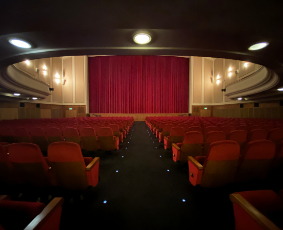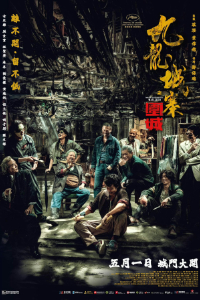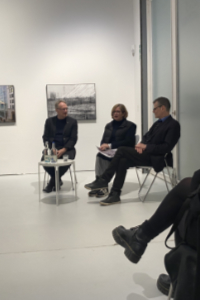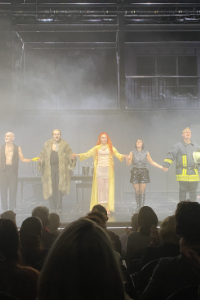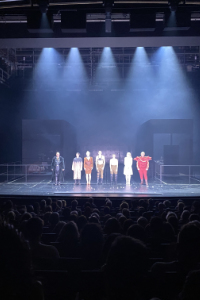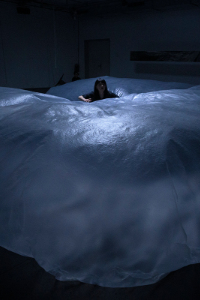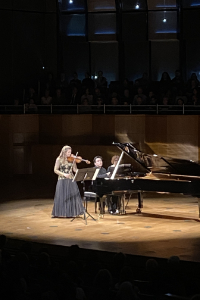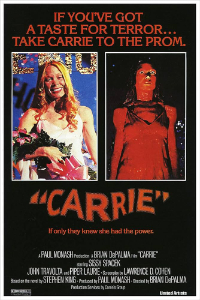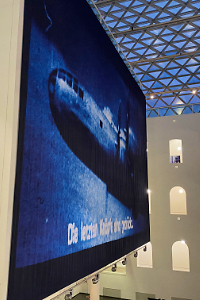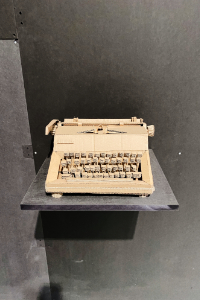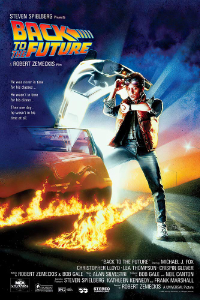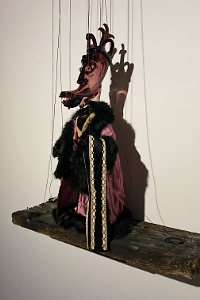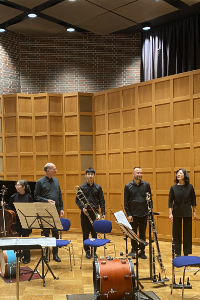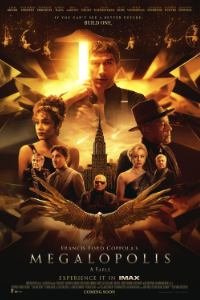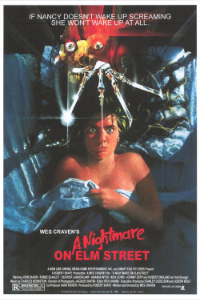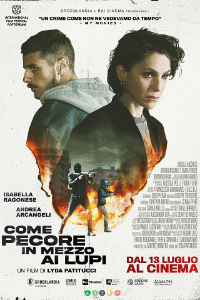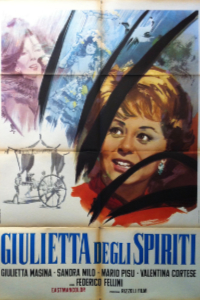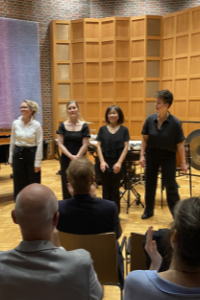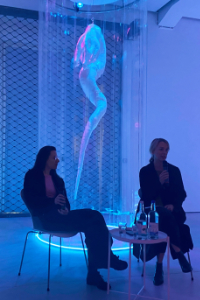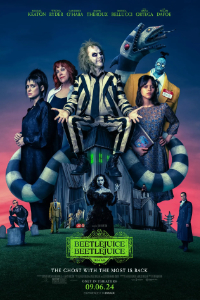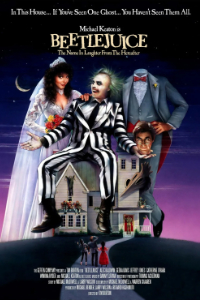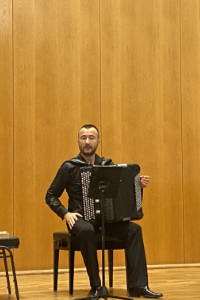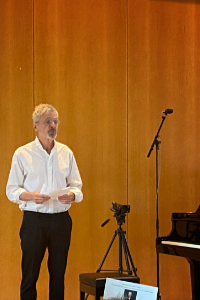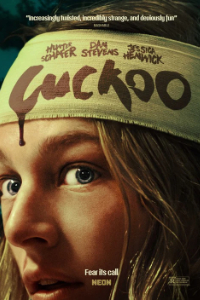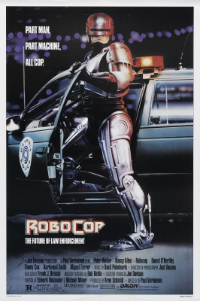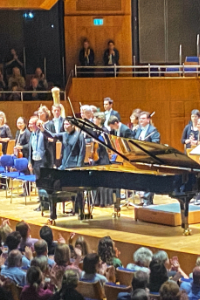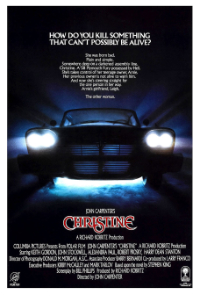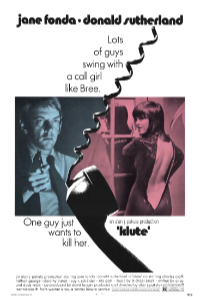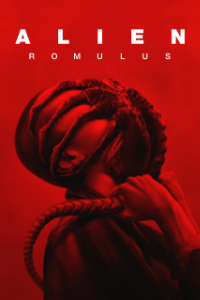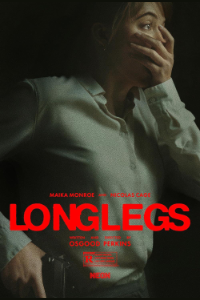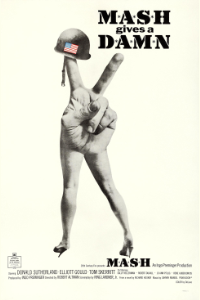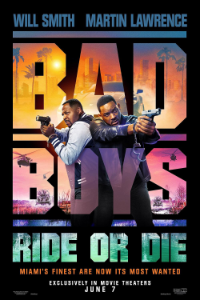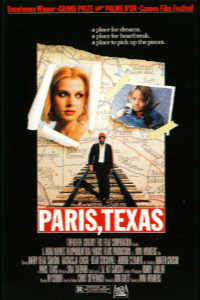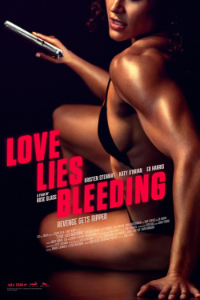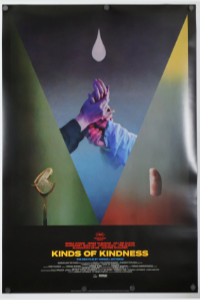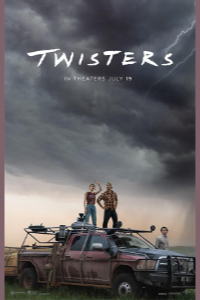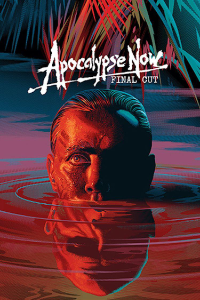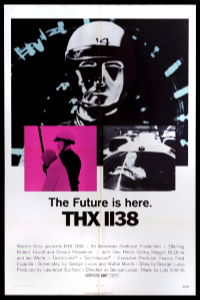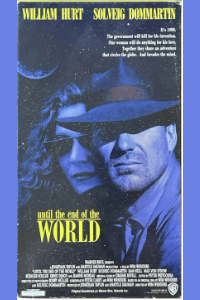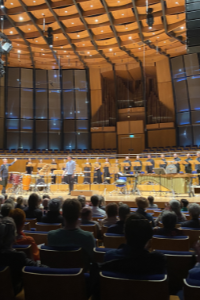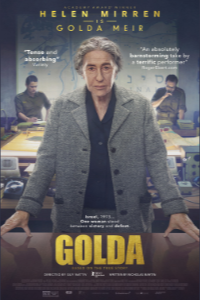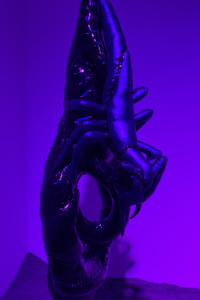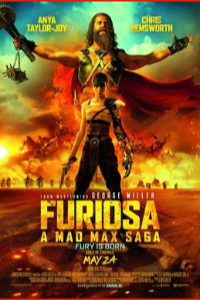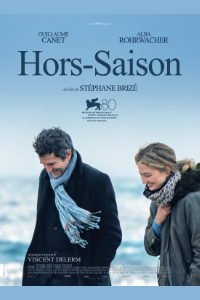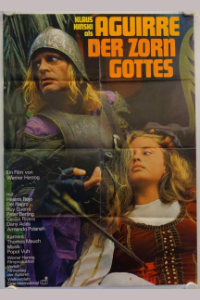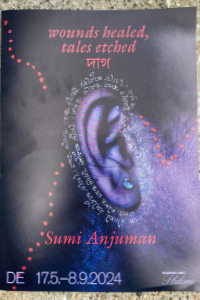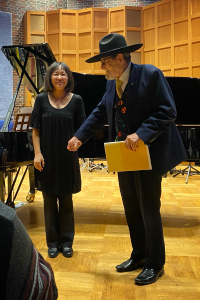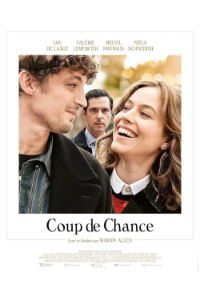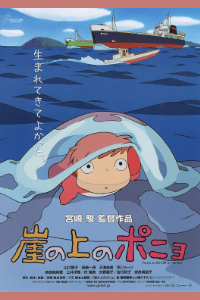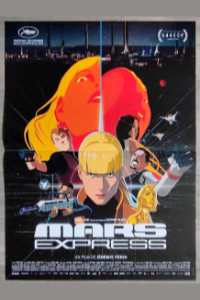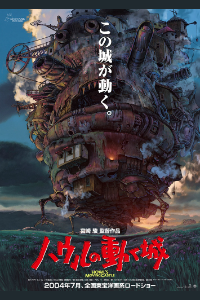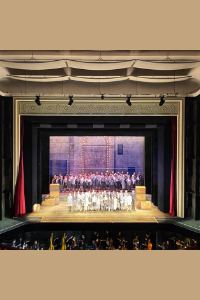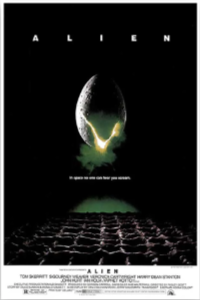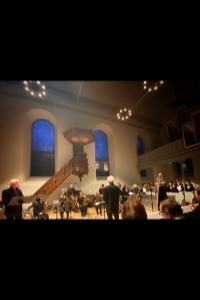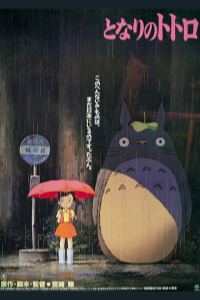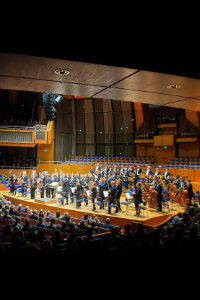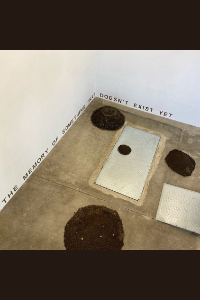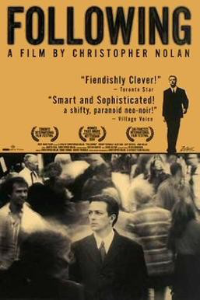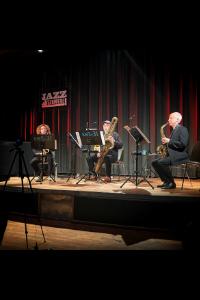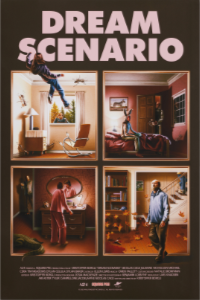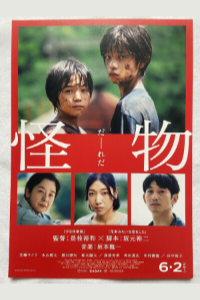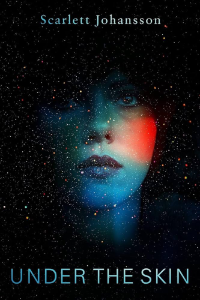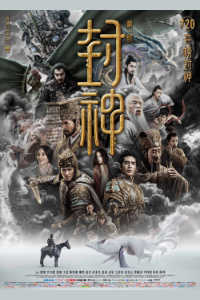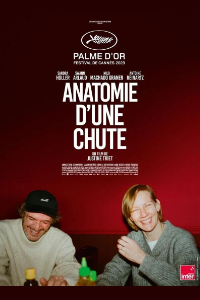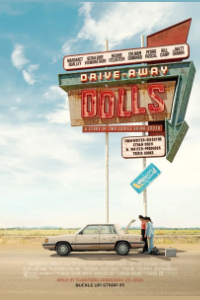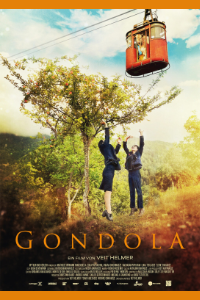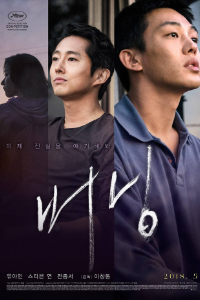Until March 2024, I wrote full-length movie, concert/theater, and exhibition reviews that I crossposted on IG and here on my blog.
But then, other things vigorously called for attention—like teaching, writing, doing sports, socializing, and having a good time in general—and I scaled back to micro-reviews that I initially published on Mastodon and then on Letterboxd and also collect in this post. (Remember, you should always put what you write on your own website too!)
Enjoy!
________________
ToC: Movies (Theater Only)
A Nightmare on Elm Street
Aguirre, der Zorn Gottes
Akuwa Sonzai Shinai/Evil Does Not Exist
Alien
Alien: Romulus
Anatomie d’un chute/Anatomy of a Fall
Apocalypse Now: Final Cut
Back to the Future
Bad Boys: Ride or Die
Beetlejuice
Beetlejuice Beetlejuice
Beoning/Burning
Carrie
Cháo gē fēngyún/Kingdom of Storms
Come pecore in mezzo ai
Coup de Chance
[John Carpenter’s] Christine
Cuckoo
Dark City
Dream Scenario
Drive-Away Dolls
Following
Furiosa: A Mad Max Story
Gake no Ue no Ponyo/Ponyo
Giulietta degli spiriti
Golda
Gondola
Hauru no Ugoku Shiro/Howl’s Moving Castle
Hors-saison/Out of Season
Kaibutsu/Monster
Kaze tachinu/The Wind Rises
Kinds of Kindness
Klute
Kowloon Walled City Siege
Longlegs
Love Lies Bleeding
M*A*S*H
Mars Express
Megalopolis: A Fable
Memento
On the Waterfront
Paris, Texas
Reverse-Thrust Family/Gyaku-funsha Kazoku
RoboCop
Rupan Sansei Kariosutoro no Shiro/The Castle of Cagliostro
Sen to Chihiro no Kamikakushi/Spirited Away
Tenkū no Shiro Rapyuta/Castle in the Sky
The Omen
The Crow (1994)
THX 1138
Tōkyō nagaremono/Tōkyō Drifter
Tonari no Totoro/My Neighbor Totoro
Twisters
Umberto Eco: La biblioteca del mondo
Under the Skin
Until the End of the World
ToC: Concerts
Neue Musik: »Kafka 100!« Finalists’ Concert
Neue Musik: notabu (Becker, Blarr)
Neue Musik: notabu (Halffter, Yun, Schlingensiepen)
Neue Musik: notabu (Bartók, Banasik, Laufer, Blarr, Xenakis)
Neue Musik: notabu (Yamaguchi, Sehin, Halffter, Rihm et al.)
Neue Musik: Return of the Moon
Neue Musik: Set-31: The Premieres
New Counterpoints: Jan Gerdes
New Counterpoints: Roman Yusipei
Opera: Mascagni & Leoncavallo
Symphony: Brahms, Järvi, Walton
Symphony: Prokofiev, Korngold
Chamber Music: Brahms, Clara Schumann
ToC: Theater
Max Frisch’s Biedermann und die Brandstifter
Wolfgang Borchert’s Draußen vor der Tür
ToC: Exhibitions & Performances
Michael Wesely: “Superimposed Past” (Talk)
Tanaka Naoko »Millarden Jahre Widerhall«
Group Exhibition “Forthcoming”
Group Exhibition “Speaking Soil”
Group Exhibition “Cutting the Puppeteer’s Strings”
Group Exhibition “Frozen Mirrors”
Sumi Anjuman
Hilma af Klint and Wassily Kandinsky
Lars Eidinger »Oh Mensch«
Mary-Audrey Ramirez (Opening) (Pending)
Mary-Audrey Ramirez (Closing) (Pending)
Katharina Sieverding
ToC: Full-Length Reviews
All full-length Movie Reviews on this blog
All full-length Music & Theater Reviews on this blog
All full-length Art Event & Exhibition Reviews on this blog
________________
DEC 04, 2024, Cinema Theater
Soi Cheang’s 2024 九龍城寨之圍城 (Kowloon Walled City Siege)
Soi Cheang aka Cheang Pou-soi’s 九龍城寨之圍城, literally “Kowloon Walled City Siege” (both the U.S. title, Twilight of the Warriors: Walled In, and the German title, City of Darkness—adapting, curiously, the title from the English manhua translation—are pretty terrible) delivers a gripping crossover of Hong Kong organized crime cinema and wuxia martial arts aesthetics (prepare for a good dose of magic) with a great cast (some actors are surprisingly anti-typecast); great work by veteran cinematographer Cheng Siu-keung (a good occasion to watch The Mission again); Kenneth Mak’s stunning recreation of Kowloon Walled City; and Tanigaki Kenji’s spectacular claustrophobic parkour-infused martial arts choreography. Au Kin-yee and her collaborators’ script, based on Yu Wing Leung aka Yu-Yi’s novel and subsequent manhua 九龍城寨 (Kowloon Walled City), doesn’t exactly invent the wheel or makes sense all the time. But there’s everything in there in good ways one expects and loves, including Hong Kong cinema’s cherished buddy movie dynamics, furious action, over-the-top evil villains, occasional slapstick, and intimate moments.
DEC 04, 2024, Kai 10 | Arthena Foundation
Talk: “Superimposed Past”
Lively, riveting conversation with Michael Wesely and Barbara Hofmann-Johnson, director of the Museum of Photography in Braunschweig, moderated by Ludwig Seyfarth, about technical and conceptual time in photography; photography’s documentary and artistic functions; and the philosophical and artistic implications of taking pictures that represent not a motif’s specific moment in time but how the motif changes with the passing of time. Wesely’s part of the group exhibition Frozen Mirrors consists of three groups of urban photographs: a group with exposure times of up to three years; a group of superimposed photographs, each with one historical image and one image taken at the same spot in the present; and a group of photographs with blown-up details from large-format images that the Prussian Photogrammetric Institute took at the beginning of the twentieth century. Like the artwork, the talk was absolutely spell-binding.
DEC 03, 2024, Düsseldorfer Schauspielhaus
Max Frisch’s Biedermann und die Brandstifter, Switzerland 1958
The cast’s performances, Irina Schicketanz’s stage design, and Adrian Figueroa’s directing were enjoyable throughout. According to Frisch, the play is a parable, which it almost certainly is. Its theme and motifs—as I see it—revolve around how greed and cowardice are intimately related. If there’s one play that describes the current display of abject cowardice of rich people in the face of a ruthless brandstifter, about which I wrote in my newsletter a few weeks ago, it’s this. That’s the beauty of a parable—it can become smack-on bullseye topical, out of the blue, almost three-quarters of a century later.
DEC 02, 2024, Düsseldorfer Schauspielhaus
Wolfgang Borchert’s Draußen vor der Tür, Germany 1946
Great ensemble and a highly dynamic postmodern/brutalist stage design by Irina Schicketanz that was absolutely fantastic and engaging. Adrian Figueroa’s directing was solid, with some character compactifications, some colloquially updated lines, and live video overlays, mostly from Beckmann’s first-person perspective. Some of these alterations, alas, made everything fuzzier and even more ambiguous than Borchert’s text, particularly around “The Woman” and her husband. As to the play itself, there’s always been a tendency to praise or criticize what one expects the play to be, and to be about, than what the text on the page actually supports. The text of the play itself is not about war in general, not about the Second World War in particular, and not about Germany’s atrocities in that war specifically. (Or, an all-time favorite, pacifism.) It’s about individual trauma and guilt (or not) in a zero-sum world where everything one person gains another must lose. That’s where the play either succeeds or falls short, not in not mentioning terrible things that have nothing to do with its theme.
NOV 22, 2024, FFT
Tanaka Naoko: »Milliarden Jahre Widerhall«
A fantastic performance with and within her artworks, drawings, an animated movie, and dynamic installations by Tanaka Naoko, as an artistic processing of her journey through the Fukushima exclusion zone. The subsequent discussion with the artist was also extremely interesting.
NOV 02, 2024, K21
Lars Eidinger: »Oh Mensch«
Yes, they’re travel photos, mostly shot on phones, and they leave ample room for those highbrow/lowbrow discussions German people are tirelessly fond of. Eidinger has an exceptionally keen eye for unusual moments, artifacts, and incidents—which, despite their unusualness, often appear spot-on representative of certain places and times. Yet, one has to be wary. As unusual and surprising these images are, no matter if funny or sad or bizarre, they’re surreptitiously—but not subtly—serving the viewer’s expectations. They have an iconic-adjacent quality to them that strongly connects to our ideas of these places and times. All of which, mind, doesn’t take away from the exhibition’s enjoyability.
NOV 01, 2024, Tonhalle Düsseldorf
Compositions by Brahms and Clara Schumann
Janine Jansen (Violin), Kim Sunwook (Piano)
The hall was packed with 1,200 people, not exactly usual for chamber music, and especially not when focused on one type of composition from one composer. Jansen and Kim delivered a fantastically nuanced, transparent, and passionately precise performance of Brahms’s violin sonatas (No.1 G major Op.78; No.2 A major Op.100; No.3 D minor Op.108) and Clara Schumann’s three violin romances Op.22. I know these pieces in and out and love them very much, and Jansen’s and Kim’s performance was absolutely amazing, convincing, and top-notch with regard to technical performance and musical insight. The brief encore was Brahms’s song »Feldeinsamkeit« with the vocal part set for violin, which my brain refused to recognize until I asked a friend afterward. Sure, the original song is way more interesting, but its adaptation nevertheless served as a fitting closing piece to finish this terrific concert.
OCT 31, 2024, CineStar Theater
Brian De Palma’s 1976 Carrie
For no particular reason, I’d never watched Brian De Palma’s 1976 Carrie before, and I’m glad to say that I loved it. De Palma, to tell the truth, was never among my favorite directors. Partly because many of his movies come across uncomfortably voyeuristic; partly because his camera work has a tendency to call attention to itself instead of strengthening the scene; partly because many of his movies—like Blow Out or Dressed to Kill—sharply overstretch the meaning of “homage.” Carrie indeed exhibits each of these issues, but in this one movie, it all feels organic, fresh, and closely tied to what’s happening, emotionally and otherwise. Together with the script’s terrific dramatic structure, the cast’s stellar performances, and the incredibly strong plot, it all works together to create a horror classic that delivers. And demands, at least in my case, several days’ worth of time to digest.
OCT 31, 2024, K21
Opening: Katharina Sieverding
Monumental Katharina Sieverding retrospective, from her huge large-format works to Polaroids, from highly political/topical works to her self-portrait close ups, from body art to experimental film. It’s way too much to absorb in one visit, and that’s not merely a quantitative issue—many of her works are too much to absorb individually in one visit. The only thing I’m not happy with is that the exhibition itself offers no technical information whatsoever as to cameras, film stocks, developing techniques, and so on. Next time, I will check the exhibition catalog; I’m pretty sure it will offer some general information, but for details, my hopes aren’t high. (As soon as I know, I will add a remark here to that effect.)
OCT 30, 2024, Kai 10 | Arthena Foundation
Opening: Group Exhibition “Frozen Mirrors”
A group exhibition focused on the illusionary aspects of works of art as “frozen images” that are suspended in time in various ways—because they’re simply not moving, conflate different moments in time, are reconstructed from different materials, consist of optical illusions, and similar. Inevitably, nostalgia is strongly attached to many if not most of the exhibited works, but always consciously embedded and reflected upon in clever ways. Demands more than one visit, and I hope there will again be further events and discussions, each attended by a different group of artists, which the Arthena Foundation typically offers. Highly recommended.
OCT 21, 2024, CineStar Theater
Robert Zemeckis’s 1985 Back to the Future
What really stands out in Robert Zemeckis’s 1985 Back to the Future is Zemeckis & Gale’s extremely well-structured and tightly plotted script where everything that happens either sets up/foreshadows or pays off/resolves something; which might not be so obvious the first time around, but becomes more apparent with every rewatch. As to the plot, with the exception of the initial test run, nothing works even remotely as planned, and while things more often than not go wrong in slapstick fashion, the script never veers into any “idiot plot” dynamic—every character indeed gives their best, only with wildly unexpected imaginative outcomes. The slapstick, moreover, is often wrapped into nostalgia and vice versa, so that the movie is always light-hearted but never crosses the line into comedy. Plus, there are dark corners. To quote Justin Chang from the LA Times, who put it very succinctly: “[The movie] is a clever puzzle whose every twist and payoff has been engineered with clockwork precision. That precision is the source of the movie’s pleasure as well as its limitations: it’s such a niftily executed parlor trick that you can almost (almost!) let some of the story’s creepier subtexts about race, sexual assault, and almost-but-thankfully-not-quite-incest pass by unremarked.” A classic that is as enjoyable to watch today as it was forty years ago.
OCT 20, 2024, Philara Collection
Opening: Group Exhibition “Cutting the Puppeteer’s Strings”
As is often the case at the Philara Collection, the opening of the extensive group exhibition “Cutting the Puppeteer’s Strings” too featured special performances, either by participating artists or their exhibited works. As the opening speech emphasized, the exhibition does not “turn the Philara Collection into a puppet theater” but offers “perspectives into private and political action” by and through contemporary art focused on puppetry, marionettes, shadow plays, and associated topics. One of the featured art works is Wael Shawky’s The Secrets of Karbala from 2015, the third part of his Cabaret Crusades trilogy, which is just incredible. (I hadn’t heard of this movie or trilogy before, but it’s based on Amin Maalouf’s 1983 book The Crusades through Arab Eyes, which I’ve actually read.) One of the glass marionettes used was also on display; click through on the thumbnail for a larger image. What’s more, as I always watch the credits, I learned that my closest friend from early high school, whom I haven’t talked to for decades, was involved in the movie’s production. Wow!
OCT 09, 2024, Tonhalle
»Na hör’n Sie mal« — Neue Musik
notabu Ensemble Neue Musik
Another great Neue Musik concert with compositions by Yamaguchi Yasuko (“Lärchenholzschindeln” for clarinet, cello, piano); Bohdan Sehin (“And the Sailors Enjoying the View of the Earth” for accordion); Cristóbal Halffter (“Triada (1+2=3)” for clarinet, violin, piano); Wolfgang Rihm (»Am Horizont: Stille Szene« for violin, cello, accordion); Mark-Andreas Schlingensiepen (»Zeichnungen IA – II – IIB« for accordion); Günther Becker (“Once Upon a Time” for bass clarinet and voice/recitative); and Raimund Juelich (»Grenzfall« for clarinet, trombone, cello, piano, each also playing a base drum). Both sets, before and after the intermission, were dynamically arranged from very quiet to very loud (and Rihm was actually—and surprisingly!—the quietest piece of all). An extremely enjoyable performance!
OCT 07, 2024, CineStar Theater
Francis Ford Coppola’s 2024 Megalopolis: A Fable
Francis Ford Coppola’s 2024 Megalopolis: A Fable is a confused and confusing movie, with future visions reminiscent of Robert McCall’s mural masterpiece “The Prologue and the Promise” on top, but uncomfortable crosscurrents reminiscent of William Gibson’s “The Gernsback Continuum” underneath. As for the action and dialogues, most of it comes across as theatrical auditions or workshops with a—generally underappreciated—Globe Theatre authenticity in its set pieces, performances, and characters. (Including, alas, a genuinely misogynist Shakespearian female villain.) Most likely, it’s not a good movie—but it just might stand the test of time if looked at from perspectives not yet available in this day and age. For a more in-depth review, Leah Schnelbach’s “Et Tu, Wow Platinum? Megalopolis’s Vision of the Future Offers Nothing New” (highly critical) and Matt Zoller Seitz’s “Megalopolis and Joker: Folie à Deux; or, The Virtue of Burning Money” (critical, but appreciative) are highly recommended.
SEP 30, 2024, Metropol Theater
Suzuki Seijun’s 1966 東京流れ者/Tōkyō nagaremono aka Tōkyō Drifter
Suzuki Seijun’s 1966 東京流れ者/Tōkyō nagaremono aka Tōkyō Drifter is an ahead-of-its-time Yakuza thriller that doesn’t romanticize loyalty; an avant-garde movie with hyper-stylized surrealist set pieces; a musical; a Western movie complete with a signature whistling tune, gunslinger shoot-outs, and a saloon brawl that also involves WW2 American service personnel; and a genre parody. Mine Shigeyoshi’s cinematography is fantastic, and it is particularly breathtaking in the introductory black-and-white rail yard scene.
SEP 27, 2024, Metropol Theater
Wes Craven’s 1984 A Nightmare on Elm Street
As a first tonight, I saw the uncut version of Wes Craven’s 1984 A Nightmare on Elm Street in a theater. And it was, like, wow. (The U.S. version too was cut back then, but in Europe in the late ’90s, I was able to watch the entire franchise uncut on a Dutch TV channel.) What I never liked was the ending—I loved Craven’s highly ambiguous foggy, dreamy original denouement, but the producer insisted on Freddy’s comeback (which also makes no fucking sense). Nevertheless, absolute classic.
SEP 24, 2024, Metropol Theater
Alex Proyas’s 1998 Dark City
Alex Proyas’s 1998 Dark City shared Blade Runner’s fate to a T: a cut-down theatrical release with an atrocious producer-enforced voice-over (which in this case even gave the major plot point away) that was well-received but then instantly became a classic when the director’s cut came out. Today, I saw that cut for the first time in the theater, and it’s gorgeous. It ticks so many boxes from my personal preferences—horror, sf, Art Deco, memory, The Matrix, you name it—and I love it to death.
SEP 20, 2024, Bambi Theater
Lyda Patitucci’s 2023 Come pecore in mezzo ai lupi
Lyda Patitucci’s 2023 Come pecore in mezzo ai lupi (Like Sheep Among Wolves) is a bleak, brutal undercover/heist thriller that’s also a generational drama, where everything is high-tension oppressive & devastating—from the city of Rome right down to families & particularly men. Besides Maio’s gorgeous cinematography & lighting, Nervi’s score, & Trepiccione’s smack-on editing, there’s Ragonese’s stellar performance, whose superspare but superexpressive presence never needs an extra line.
SEP 19, 2024, Bambi Theater
Federico Fellini’s 1965 Giulietta degli spiriti
Federico Fellini’s 1965 Giulietta degli spiriti (Juliet of the Spirits) was his first feature film in color (35mm Technicolor), with Di Venanzo as cinematographer and (as usual) Rota as composer, and it’s gorgeous. Giulietta Masina, Fellini’s wife, plays the lead, and lore has it that Fellini wrote the story and script for her as a “gift”—which Robert Ebert’s eagle-eyed 4-star review cleverly dissects. The theatrical copy was meticulously remastered and an absolute delight to watch.
SEP 18, 2024, Tonhalle
»Na hör’n Sie mal« — Neue Musik
notabu Ensemble Neue Musik
Fujieda Yukiko & Friederike Möller (Piano & Toy Pianos)
Salome Aldorf & Vera Seedorf (Percussion)
Compositions by Xenakis, Blarr, Banasik, Laufer, Bartók
Highly memorable Neue Musik concert in the Tonhalle’s packed chamber music hall with spectacular performances of riveting compositions, some of which—Bartók, in particular—with stunning difficulty levels. Norbert Laufer and Christian Banasik were in attendance (click thumbnail, left, left to right: Schlingensiepen, Sommer-Sorgente, Banasik, Laufer), as was Oskar Gottlieb Blarr, albeit incognito (LOL not really).
SEP 17, 2024, Metropol Theater
Alex Proya’s 1994 The Crow
While Alex Proyas’s 1994 The Crow is clearly a case of style over substance, it’s still metal in every respect—Wolski’s cinematography and Honig & Smith’s editing that perfectly capture the visual language and pacing of graphic novels, respectively; the incredible soundtrack and Revell’s brooding score; the expressionist urban hellscape of an unrecognizable Detroit; and Wincott’s oozing menace and contempt that delivers a perfect foil to Lee’s haunting and haunted iconic performance.
SEP 15, 2024, Kai 10 | Arthena Foundation
Closing: Mary-Audrey Ramirez’s “Unsolicited Awakening”
PENDING
SEP 11, 2024, Atelier Theater
Tim Burton’s 2024 Beetlejuice Beetlejuice
Let’s face it, the script for Tim Burton’s 2024 Beetlejuice, Beetlejuice is bad. It fails to dramatically integrate an important side plot (Delores); leaves a crucial plot device unsolved (Richard); and has a final nick-of-time reversal that is awfully weak sauce (the contract). Despite this, the movie is extremely enjoyable—with more sympathetic Deetzes (good!); even more kooky after-death pandemonium (good!); a terrific Keaton who picks up on his original performance that both aged well and hasn’t aged a bit; and a vintage Burtonish style from slapstick timing to practical effects that his later movies sadly lacked.
SEP 11, 2024, Atelier Theater
Tim Burton’s 1988 Beetlejuice
In Tim Burton’s 1988 Beetlejuice, everything’s cranked up to 100—the Maitlands’ sweet naïveté; the hilariously disfunctional Deetzes family; Keaton’s jackass exorcist demon; and the ever more bizarre afterlife denizens, all acting and interacting frantically with each other inside the most outrageous set pieces. The script is pretty much an incoherent mess, but that gives the narrative a chaotic dreamlike quality that rhymes well with everthing else, particularly slapstick, timing, and the supreme grossness of Keaton’s Beetlejuice character.
SEP 06, 2024, Palais Wittgenstein
New Counterpoints: »So werden die Steine schreien«
Roman Yusipey (Akkordeon/Bajan)
Works from 8 Composers (click thumbnail for full program)
Second concert in a double bill, excellent but also depressing, with four Neue Musik pieces and pieces from four Ukrainian composers who fled from the ongoing war.
SEP 06, 2024, Palais Wittgenstein
New Counterpoints: Piano Miniatures
Jan Gerdes (Piano)
Works from 20 Composers (click thumbnail for full program)
First concert in a double bill, a really fun one, with miniatures from twenty composers from the English Renaissance to today’s Neue Musik and from classical to jazz to pop.
SEP 03, 2024, Metropol Theater
Tilman Singer’s 2024 Cuckoo
Tilman Singer’s 2024 Cuckoo, like many psychological horror thrillers, is also a coming-of-age story. It’s shot on Kodak 500T & 250D 35mm film stock (yeah!) which looks gorgeous; direction & cinematography are excellent; and Schafer delivers a hands-down breathtaking performance. Much is reminiscent of Lynch’s original Twin Peaks—everyone acts ambiguously, ranging from the weird to the bizarre, not letting on if they’re merely quirkily eccentric or lethally malicious. Must watch again next week!
SEP 03, 2024, Metropol Theater
Paul Verhoeven’s 1987 RoboCop
Together with Starship Troopers, Verhoeven’s 1987 RoboCop stands the test of time as one of the most outlandishly violent social satires ever filmed. Even in the U.S. back then, the theatrical version was cut (not to speak of Europe, where I thankfully rarely dwelled at the time), and the uncut/unrated version was only available much later on DVD and then on Blu-ray. Tonight, I saw the uncut version for the first time at a theater—and, I gotta say, this is a fucking 10/10 classic.
Addendum: Just read the uncut version was ver-boh-ten! in Germany on all media until 2013. This fucking country.
SEP 02, 2024, Tonhalle Düsseldorf
Compositions by Sergei Prokofiev and Erich Wolfgang Korngold
Düsseldorfer Symphoniker, Simon Trpčeski (Piano), Alpesh Chauhan (Conductor)
Another terrific performance and season opener at Düsseldorf Tonhalle, with my favorite principal guest conductor Alpesh Chauhan and pianist Simon Trpčeski: Prokofiev’s 2nd piano concerto and Korngold’s symphony. The reason I went there was the latter—sure, Prokofiev’s piece is nice and all & has heart-warming biographical details, but Korngold’s only symphony is where it’s at. It’s super interesting & extremely enjoyable and packs a punch, but it’s also very delicate & demanding in terms of balancing its humongous apparatus.
AUG 30, 2024, Metropol Theater
John Carpenter’s 1983 Christine
John Carpenter’s 1983 Christine is still enjoyable to watch. The pacing is a bit off at times, but the special (practical) effects are excellent. Also, Carpenter takes the story seriously, which is a good thing. Stephen King, it is said, found it “boring,” just like Stanley Kubrick’s 1980 The Shining. Well, King wrote some of the best genre novels I’ve ever read, but his taste in film is generally abysmal, and that adaption he directed himself, 1986’s Maximum Overdrive, is a ridiculously unwatchable waste of celluloid.
AUG 20, 2024, Metropol Theater
Alan J. Pakula’s 1971 Klute
Alan J. Pakula’s 1971 Klute is an exceptional movie in many respects. First off, it has numerous ingredients typical for a horror movie, from Willis’s camera positions, angles, and movements that often seem to evoke a hidden predator to Lerner’s deliberately disorienting editing to Small’s eerily foreboding piano effects. Then, it lacks many genre ingredients of both thriller and murder mystery; neither is the tension relentlessly mounting nor do its whodunit elements feel dramaturgically significant. Next, thanks to Fonda’s matchless performance and the script rewrites she initiated on set, the movie works like an intense character study that illuminates psychological and sociological aspects of a profession most people know nothing about beyond cliches and stigmas. Finally, the purported protagonist is mostly a silent observer, a foil against which the unfolding events can be observed and reflected upon. Klute is one of these rare movies that completely ignores genre conventions and audience expectations and still becomes a critical success and a treasured classic.
AUG 19, 2024, Metropol Theater
Ishii Sōgo’s 1984 逆噴射家族 (Gyaku-funsha Kazoku/Reverse-Thrust Family)
I: Just watched Ishii Sōgo’s 1984 逆噴射家族 (Reverse-Thrust Family) w/subs at the theater and now I need a vacation. Kobayashi Yoshinori’s script compresses huge loads of Japan’s historical atrocities & current societal pressures and maps the output onto a family of five who are individually likable except when they aren’t. And with every laugh, you get bizarre slapstick on the outside and murderous madness on the inside, until life collapses literally into a happy wasteland. Terrific movie.
II: Apropos Ishii Sōgo’s 1984 逆噴射家族 (Reverse-Thrust Family), I forgot to mention that the movie’s title sounds whimsical but isn’t. It refers to the Japan Airlines Flight 350 [JP | EN ] accident off the coast of Haneda in 1982. The pilot—who was later diagnosed with “paranoid schizophrenia”—intentionally crashed the plane by applying reverse-thrust to the engines, killing 24 and seriously injuring 95. When the movie came out, everybody understood the reference in the title.
AUG 14, 2024, CineStar Theater
Fede Álvarez’s 2024 Alien: Romulus
I’ll have to write a full-length review (as the Alien franchise is basically my home turf), yet I feel I should wait unit I’ve watched the movie at least twice. But, up front, Alien: Romulus is not only pretty awesome but also does justice to the franchise’s roots. The references—UIs, typography, sounds, dialogues, other things I don’t want to spoil—are almost overwhelming at times, but never annoying even for me who knows the original trilogy’s every scene & dialogue & filming & effects history by heart. (Yes, trilogy—let’s not talk about Resurrection, please.) Also, strong pen-&-paper RPG vibes!
AUG 13, 2024, Metropol Theater
Osgood Perkins’s 2024 Longlegs
Osgood Perkins’s script for his 2024 Longlegs is good enough to have warranted a rewrite—obvious weaknesses are the plot’s lack of focus; the story’s lack of a tangible purpose; and an exposition dump. A less obvious weakness is that foreshadowings are either too on-the-nose or missing. But still, it’s highly enjoyable—lead performances are great; Arochi’s cinematography & Battaglia’s sound design top-notch; title card handling’s a blast; and the movie serves suspension & unsettling scares aplenty.
AUG 13, 2024, Metropol Theater
Robert Altman’s 1970 M*A*S*H
Robert Altman’s 1970 M*A*S*H robustly stands the test of time. Sutherland & Gould are an incredible team. Skerritt & Duvall inject as much slimy creepiness into their respective characters as Kellerman injects true blue enthusiasm into “Hot Lips’s” transformation from over-the-top bigoted to over-the-top good sports naivete. Altman’s & Greene’s genius dialogue/cut timings enable the lead actors to underplay & still be outrageously funny against M*A*S*H’s insane blood and gore backdrop.
AUG 09, 2024, CineStar Theater
Adil & Bilall’s 2024 Bad Boys: Ride or Die
Adil & Bilall’s 2024 Bad Boys: Ride or Die is a chaotic high-octane mixture of frenetic slapstick, insane action cinematography, video game-y shootouts, hyper-stylized set pieces, and a convoluted retcon plot that is hard to comprehend if you missed even just one movie of the franchise. In other words, it’s thoroughly enjoyable! And it’s exactly the summer popcorn movie it’s supposed to be.
AUG 01, 2024, Metropol Theater
Wim Wenders’s 1984 Paris, Texas
I watched the 2024 4K digitally restored version of Wim Wenders’s 1984 Paris, Texas at the theater, and it’s better than ever. There’s nothing I can add to what’s already been said during the last *what* 40 years, except that Shepard’s dialogues, Cooder’s score, Müller’s cinematography, and Przygodda’s cut hold up exceptionally well, and so does the cast. (Müller never mentioned what he used, but behind-the-scenes shots show an Arriflex 35BLIII, and maybe a Zeiss Superspeed lens.)
JUL 31, 2024, Atelier Theater
Rose Glass’s 2024 Love Lies Bleeding
Rose Glass’s 2024 Love Lies Bleeding is an intense violence- & homage-heavy romantic grindhouse neo-noir pulp dark comedy buddy film period piece thriller with a remarkably clever script (Glass & Tofilska), drop-dead gorgeous cinematography (Fordesman), eerily disturbing “what the hell was that?” sound effects (Davis), intense music (Mansel), and stellar performances (Stewart & O’Brian) that relentlessly cheerfully oscillates between neon-infused gritty realism & fever-dream Americana.
JUL 30, 2024, Cinema Theater
Yorgos Lanthimos’s 2024 Kinds of Kindness
Kinds of Kindness, my first Lanthimos movie, impressed me immensely, most of all part 2. It’s structured like a Concerto grosso in three movements with a set of soloists who modulate the piece’s theme & motifs along different keys, tempi, and moods. The often cited “control” is, I think, not its theme; it rather supports as one motif among many—worship, fealty, projection, coercion, etc.—the theme of extreme kinds of “devotion” that shatter both free will and bodily integrity.
JUL 16, 2024, CineStar Theater
Lee Isaac Chung’s 2024 Twisters
Lee Isaac Chung’s 2024 Twisters is thoroughly entertaining with solid performances, a competent if often predictable screenplay, and enough of Oklahoma’s lovely landscape and its equally lovely mix of Midwestern and Southern speech to hold me spellbound. Also, lots of tornadoes!
JUL 15, 2024, Lichtburg Theater
Francis Ford Coppola’s 1979/2019 Apocalypse Now: Final Cut
Francis Ford Coppola’s 2019 Apocalypse Now: Final Cut is a terrific experience in every respect. It’s a lot better than the abridged 1979 theatrical release, and also a lot better than Coppola’s 2001 Redux version, which didn’t merely restore the movie to its original length but threw back in everything that had been cut out for good reasons in post. Also, the Final Cut version is remastered for 4K laser projector & Dolby Surround and blows you right out of your fucking seat.
JUL 09, 2024, Metropol Theater
George Lucas’s 1971 THX 1138
George Lucas’s 1971 THX 1138 isn’t blessed with the most coherent script, to put it mildly, but it’s nevertheless an impressive movie. Myers & Kihn’s cinematography and Haller’s set pieces are visually dazzling; Schifrin’s score is a great fit; and the sound design is outstanding. It’s an art movie, definitely, but it also has enough other stuff, like car chases and motorbike stunts, that widens its appeal. And then there’s this extremely clever idea of tying ongoing police operations to effective expenditures in real time, a hyper-capitalist artifact in this bleak future society that eventually happens to work in the protagonist’s favor. The version they showed at the theater was the restored 1977 version, not Lucas’s 2006 director’s cut. I don’t know whether that’s a good thing or a bad thing, but there are precedents, and I have my thoughts.
JUN 09, 2024, Lichtburg Theater
Wim Wenders’s 1991 Until the End of the World
Back in the days, I didn’t want to watch Wim Wenders’s 1991 Until the End of the World—not because it was “poorly received,” but because it was brutally edited down for the U.S. and European markets to 158 and 179 minutes, respectively. The version I had the privilege to watch last night was a 287-minutes director’s cut that was also a digital 4K restoration from an original 35mm copy, commissioned by the Wim Wenders Foundation. Holy shit, what a movie. The screening was attended by Wim Wenders in person, with a subsequent discussion and Q&A session. My questions, as usual, touched upon the writing process, but I quickly realized that these were some kind of “not-even-wrong” questions: as it turned out, Wenders’s approach to screenplays and the writing process in general is unorthodox in ways that needed some rethinking on my part. As to the movie itself, there’s so much going on there that I need to watch it again—the theater manager promised that would happen!— before I can write a more substantial review that does justice to this magnificent movie.
JUN 07, 2024, Tonhalle Düsseldorf
Return of the Moon (Supernova | Neue und neueste Musik)
Alexej Gerassimez (Percussion); Chorwerk Ruhr; Justin Doyle (Conductor)
Compositions by Alexej Gerassimez, Peter Klatzow, Robert Schumann, Iannis Xenakis, Rebecca Dale
The label »neue und neueste Musik« was somewhat misleading. The performed pieces were contemporary compositions all right, but not »Neue Musik« by any stretch, and some people in the audience were not amused. Still, for contemporary tonal music, it was highly enjoyable.
JUN 05, 2024, Metropol Theater
Guy Nattiv’s 2023 Golda
At first, I was reluctant to go and watch Guy Nattiv’s 2023 Golda. It wasn’t because Helen Mirror isn’t Jewish; Gideon Meir, Golda Meir’s grandson, wanted her to be cast, and when Golda Meir’s family is fine with it, why shouldn’t I. No, the reason was that the movie was filmed in English, and that was the thing I found inappropriate. (Just imagine an English speaking cast in Glazer’s The Zone of Interest, for example.) But then I went, and it turned out to be fine, and it even became a case of “careful what you wish for”—everything that goes on “outside” is original footage from the war, wireless messages and the like, which cut so close to the bone that I felt thoroughly wrecked when the movie was over. The movie as such is fine, more like an intimate chamber play than a historical biopic, and more focused on psychological than on historical dynamics. Still, the terrible losses and the mounting desperation during the first days of the attack come through pretty well, I think, even for people who do not have a good historical picture of what happened in 1973. and more focused on psychological than on historical dynamics. Still, the terrible losses and the mounting desperation during the first days of the attack come through pretty well, I think, even for people who do not have a good picture of what happened in 1973.
JUN 04, 2024, Kai 10 | Arthena Foundation
Opening: Mary-Audrey Ramirez’s “Unsolicited Awakening”
PENDING
MAY 22, 2024, CineStar Theater
George Miller’s 2024 Furiosa: A Mad Max Saga
Back from the advance screening of George Miller’s 2024 Furiosa: A Mad Max Saga on a huge multiplex screen: when the post-credits stopped rolling, I wished I could just remain seated and watch it all over again. Insanely good. While Fury Road is primarily character-driven, Furiosa is primarily story-driven. And what a story! As for the action, there’s more than plenty, yet not as much and not as relentlessly spectacular (but still awesome) as in Fury Road—because in this movie, it’s not needed.
MAY 21, 2024, Metropol Theater
Elia Kazan’s 1954 On the Waterfront
Elia Kazan’s 1954 On the Waterfront is a dazzling blend of outgoing expressionism & American realism with a fantastic script, incredible actors—Brando making method acting single-handedly famous—and Bernstein’s only original score. Watching it on a theater screen feels like being knocked over by a freight train. he copy, alas, came with a German subtitle set from 1955, a blazing dumpster fire that was hard to ignore: every single line was either wrong, staggeringly skewed, or sanitized.
MAY 21, 2024, Metropol Theater
Stéphane Brizé’s 2023 Hors-saison
Set against Héberlé’s breathtaking capture of seaside Brittany, Stéphane Brizé’s 2023 romantic drama Hors-saison, written w/ Marie Drucker, is entirely focused on its two main characters. Perfectly played by Canet & (Alba) Rohrwacher, they’re comical, melancholic, self-deprecatingly sentimental, affectionate, and relatably confused about themselves, their past, and their future. Everything—along with unexpected excursions—is thoroughly enjoyable, romantic, touching, & resolutely French.
MAY 20, 2024, Metropol Theater
Werner Herzog’s 1972 Aguirre, der Zorn Gottes
Saw Werner Herzog’s 1972 Aguirre, der Zorn Gottes for the first time in a theater—impressively clever use of historical sources, and Mauch’s breathtaking cinematography w/ a single 35mm camera feels like an actor in its own right. Kinski’s not unhinged but menacing—which, according to Herzog, was pulled off by provoking him pre-take into a rage that exhausted him sufficiently to behave as intended during filming. Sadly, the on-set voice recordings were unusable, and the entire movie had to be dubbed (without Kinski).
MAY 16, 2024, Philara Collection
Opening: Sumi Anjuman’s “Wounds Healed, Tales Etched”
Impressive collection of photographs supplemented by overpaintings, embroidery, and archival materials and arranged into installations, focused on norms and identities and patriarchal, gender, and sexuality-specific oppression. It all cuts very deep, but the motif of healing is also present throughout.
MAY 15, 2024, Tonhalle
»Na hör’n Sie mal« — Neue Musik
notabu Ensemble Neue Musik, Mark-Andreas Schlingensiepen (Conductor)
Compositions by Günther Becker and Oskar Gottlieb Blarr
Highly interesting & delightful »Neue Musik« concert with the Notabu ensemble, with 2 pieces by Günther Becker and 2 pieces by Oskar Gottlieb Blarr—the latter had turned 90 two weeks ago and was in attendance. I know him from waaay back, and we had a lengthy chat. When he switches to anecdote mode, nothing can stop him—but he’s always both entertaining and enlightening! He’s still an active composer and frequently attends musical events. Hopefully, he’ll be around for many more years!
MAY 14, 2024, Bambi Theater
Miyazaki Hayao’s 2013 風立ちぬ (Kaze tachinu/The Wind Rises)
Miyazaki Hayao’s 2013 風立ちぬ (Kaze tachinu aka The Wind Rises) is not only a fantastic movie, but remarkable and unusual in several ways. First, the use of human voices for Foley, which is uncannily effective especially during the Kantō earthquake sequence. Then, its odd genre type: a purposefully fictional biography of an actual historical figure, the inventor of the A5M and the A6M Zero. Finally, most reviews presuppose a fully sympathetic hero, which he’s clearly not—for subtle reasons and cultural markers worth a more thorough review in the future.
MAY 08, 2024, Metropol Theater
Woody Allen’s 2023 Coup de Chance
Very good in Woody Allen’s 2023 Coup de Chance are the actors, music, pacing, and of course Storaro’s terrific cinematography. The story is neat but not unfamiliar, revolving around some of Allen’s pet motifs. The French dialogues are witty and nice but not brilliant. As for the plot, what “chance” events how & when happen is perfectly fine, but too many unacknowledged implausibilities pile up—need to pile up—to set the stage for them. Thus, an enjoyable movie but far from being a classic.
MAY 07, 2024, Bambi Theater
Miyazaki Hayao’s 2008 崖の上のポニョ (Gake no Ue no Ponyo/Ponyo)
Miyazaki Hayao’s 2008 崖の上のポニョ (Gake no ue no Ponyo aka Ponyo) blew me away with its incredible hand-drawn artwork, laugh-out-loud humor, loving details, rich themes & motifs, and absolutely everything. Yet, despite critical acclaim & box office records many reviews went down the “not one of his best but…” path, as if Miyazaki’s movies were in competition with each other, and bandied about more of that “there’s no real conflict” nonsense notoriously leveled at となりのトトロ aka My Neighbor Totoro. Such a lovely movie! On top, リサ aka Risa was instantly down on my all-time favorite movie characters list.
MAY 01, 2024, Bambi Theater
Jérémie Périn’s 2023 Mars Express
The general motifs in Jérémie Périn’s 2023 Mars Express certainly don’t break new ground, with its abundance of familiar tropes pointing toward I, Robot; Blade Runner; 攻殻機動隊 aka Ghost in the Shell; and what have you. But everything else, from characters to dialogues to world design to Avril and Monthaye’s captivating score to the movie’s art work and cinematography are so fantastic that everything feels fresh and exciting (and depressing, of course, as this is a cyber noir thriller). Add to that sustained human drama integral to the narrative you wouldn’t expect to find in an animated scifi movie, which keeps you as much on the edge of your seat as the plot’s unexpected twists. Considering the movie’s rather unimpressive budget of €9m (Pixar and Disney movies are in the $200m range and up), it’s actually an indie movie—but you wouldn’t know it if it weren’t for its outstanding, and outstandingly different, creative art work and narrative.
APR 30, 2024, Bambi Theater
Miyazaki Hayao’s 2004 ハウルの動く城 (Hauru no ugoku shiro aka Howl’s Moving Castle)
When I watched Miyazaki Hayao’s ハウルの動く城 (Hauru no ugoku shiro aka Howl’s Moving Castle) back in 2004 I liked it, but yesterday I realized I love it. Once again, there’s no clear antagonist—except maybe war itself, directly or indirectly supported by a whole cast of contagonists who follow their own agendas without being outright evil (plus a king with manifest Wilhelm II vibes). Finally, I remember Roger Ebert not liking the movie while having only seen the dubbed version and confusing important characters.
APR 30, 2024, Bambi Theater
Hamaguchi Ryusuke’s 2004 悪は存在しない (Aku wa Sonzai Shinai/Evil Does Not Exist)
I: Beyond well-crafted dialogues and Ishibashi’s terrific score, Hamaguchi Ryusuke’s 2023 悪は存在しない aka Evil Does Not Exist falls flat. Nature doesn’t equal art, and both Kitagawa’s cinematography and the quality of his (unlisted) digital camera are mediocre at best. With the sound design, it’s similar. Some indicators & an out-of-left-field ending mark the movie as a parable, but this fiendishly difficult literary form needs a lot more work to not merely wind up being portentously opaque.
II: As an addendum, there’s an interview with the director, titled “Evil Does Not Exist director unpacks its strange, controversial ending,” which delivers a lot of Bunk. Hamaguchi isn’t “unpacking” anything in this interview regarding the movie’s ending—what it’s actually reminiscent of is the reps’ ad-lib justifications in the movie’s town meeting scene, in terms of sincerity and explanatory power. Sure, the ending would have been perfectly fine for the originally planned wordless 30 min short to accompany Ishibashi Eiko’s live score. For a feature film ending, however, it’s not fine, and no amount of hand-waving will change that.
APR 27, 2024, Rheinoper
Pietro Mascagni’s 1890 Cavalleria rusticana & Ruggero Leoncavallo’s 1892 Pagliacci
Directed by Christof Loy (production) and Paolo Arrivabeni (music)
Mascagni’s Cavalleria rusticana and Leoncavallo’s Pagliacci were on the usual double bill at Rheinoper Düsseldorf (as a repertoire performance from 2003). Both operas are remarkably emotionally effective, and what Cavalleria’s libretto lacks in complexity it makes up for with arias and the famous intermezzo that are absolute bangers. The stage design was natural/authentic; there was a very clever foreshadowing twist in Cavalleria’s first scene, and the ensemble and DSO were fantastic.
APR 26, 2024, Metropol Theater
Ridley Scott’s 1979 Alien
I: The version I saw tonight was the original 1979 cut, which I hadn’t seen in a theater for ages, not Scott’s 2003 cut. The 2003 cut is very good, with tighter pacing for a more contemporary audience and several brief but powerful scenes (some of which even I didn’t know existed) spliced in. But Rawlings & Weatherley’s original cut is unmatched, and so is—rarely mentioned alongside cinematography, art, or music—Leather, Shields, & Rowe’s incredibly visceral sound design and original mix.
II: I never rank films (or books or games), and if you asked me for my “favorite movies” I’d approach three digits in no time with circular breathing. But 3 movies were absolute life changers, as to how I felt and saw the world and myself in it and such, and that was Altman’s The Long Goodbye, Scott’s Alien, the Wachowskis’ The Matrix, and Iwai Shunji’s スワロウテイル (Suwarōteiru aka Swallotail Butterfly). Incidentally, two out of four of my most life-changing books were Chandler’s The Long Goodbye and @GreatDismal’s Neuromancer. Go figure!
APR 23, 2024, Bambi Theater
Miyazaki Hayao’s 2001 千と千尋の神隠し (Sen to Chihiro no Kamikakushi/Spirited Away)
Last week, I watched Miyazaki Hayao’s 千と千尋の神隠し aka Spirited Away at the theater with a (remarkably crappy) German subtitle set. So far, I’d seen it only in Japanese, and even though my Japanese is way not good enough, the story is told visually so well that—provided some cultural knowledge—it’s always clear what’s going on. Sen/Chihiro’s character arc is also noteworthy; she develops agency much earlier in the story than she would have in any comparable Disney/Hollywood movie.
APR 17, 2024, Neander Church
»Na hör’n Sie mal« — Neue Musik
notabu Ensemble Neue Musik, Mark-Andreas Schlingensiepen (Conductor)
Compositions by Cristóbal Halffter, Yun I-sang, and Mark-Andreas Schlingensiepen
Neue Musik concert with the notabu ensemble at Neanderkirche Düsseldorf: Cristóbal Halffter’s furious 1994 commemorative «Endechas para una reina de España» string sextet; Yun I-sang’s “Monolog for Bassoon”: and, as a premiere, Mark-Andreas Schlingensiepen’s “…in the Struggle for Life,” a complex, demanding piece for baritone, prerecorded voices, vibraphone, contrabass fluite, and children’s choir with texts from Darwin’s private autobiography. Awesome experience, great conversations.
APR 16, 2024, Bambi Theater
Miyazaki Hayao’s 1988 となりのトトロ (Tonari no Totoro/My Neighbor Totoro)
Some claim Miyazaki Hayao’s 1988 となりのトトロ (aka My Neighbor Totoro) has no conflict or dramatic structure, which is nonsense. (And don’t get me started on that vapid conspiracy theory.) What the movie doesn’t have is a human antagonist: it has an antagonistic force instead, manifest as the children’s uncertainty/anxiety about their mother’s condition and the new environment (plus a subtle post-war subtext if you look closely and know some history). So lovely, I again cried in the theater.
APR 16, 2024, Metropol Theater
Christopher Nolan’s 2000 Memento
With Memento, finally, I’ve seen every movie directed by Christopher Nolan, his last four—Interstellar, Dunkirk, Tenet, Oppenheimer—in 70mm analog and Interstellar also at a state-of-the-art IMAX in The Netherlands. As time and memory and, with that, the slippery nature of reality have fascinated me since I was a kid, Nolan’s movies have a habit of living rent-free in my head for months, even years, and Memento is no different. It’ll take time to digest (and I’m still chewing on Tenet).
APR 15, 2024, Tonhalle Düsseldorf
Compositions by Johannes Brahms, Kristjan Järvi, and William Walton
Düsseldorfer Symphoniker, Stephen Hough (Piano), Alpesh Chauhan (Conductor)
Terrific performance this week at Düsseldorf Tonhalle, with my favorite principal guest conductor Alpesh Chauhan & pianist Stephen Hough: Brahm’s 1st piano concerto; Järvi’s commissioned “OHM–TWILIGHT” (tonal, enjoyable, with a Jew’s harp as core rhythm instrument); and Walton’s 1st (which, not counting its Tchaikovsky-style overboard 2nd movement, is also a great piece of music). Particularly the DSO’s brass section, for which both Brahms and Walton are quite taxing, did an excellent job.
APR 12, 2024, K21
Opening: Group Exhibition “Forthcoming: Speculations in Urban Space”
The “Forthcoming: Speculations in Urban Space” opening at K21 was relaxed and not too crowded, so that I could enjoy the artwork more thoroughly than it’s usually possible at opening nights, with subsequent conversation over a glass of wine at early summer temperatures in the garden. This exhibition topic (I once gave a presentation for the Kunstsammlung NRW on “The Vertical City”) with its intriguing and engaging exhibits were right up my alley.
APR 10, 2024, Philara Collection
Opening: Group Exhibition “Speaking Soil”
The “Speaking Soil” opening at Philara was a blast, with 12 young artists in residence from 7 countries who were a delight to talk to (and to their friends who’d come over from Brussels), accompanied by theatrical, musical, and live drawing performances and chilled Muscadet from the bar. At Philara right now, you’ll also find the collection presentation “In Abwesenheit” & “Artichoke Underground.”
APR 09, 2024, Bambi Theater
Miyazaki Hayao’s 1979 ルパン三世 カリオストロの城 (Rupan Sansei Kariosutoro no Shiro/The Castle of Cagliostro)
Miyazaki Hayao’s 1979 ルパン三世 カリオストロの城 (Rupan Sansei: Kariosutoro no Shiro aka Lupin III: The Castle of Cagliostro) is a hilarious action-adventure/heist comedy you wouldn’t expect from Miyazaki, even if it’s his first feature film. But if you happen to know the original Lupin III character from Katō Kazuhiko aka Monkey Punch’s manga and other anime based on it, it becomes very clear that Miyazaki did his very own thing already. Now, the plot is insane, the art work stunning, and I doubt you can cram more slapstick and raw chaos into one hundred minutes. Must-watch.
APR 09, 2024, Metropol Theater
Christopher Nolan’s 1998 Following
With the 1998 “Man of the Crowd”-inspired neo-noir crime thriller Following—B&W 4:3 16mm film shot with an Arriflex 16BL on a 6K budget—you get Christopher Nolan in a nutshell: non-chronological structure, a memory thief, final reveals going off like firecrackers. Spell-binding cinematography & music w/ well-placed silence (but undistinguished sound design). The female lead’s acting’s been criticized, but I’d say her acting is exactly what the script demands, done well. Excellent movie.
APR 09, 2024, Bambi Theater
Miyazaki Hayao’s 1986 天空の城ラピュタ (Tenkū no Shiro Rapyuta/Castle in the Sky)
Miyazaki Hayao’s 1986 天空の城ラピュタ aka Castle in the Sky, his third feature film & first Ghibli production, is a retrofuturistic steampunk action-adventure fairy tale with a sprawling yet tightly-woven script, environmental motifs, and unforgettable characters that are resourceful, lovable, and always pressing forward. It’s deep and sad and pensive but also funny and hilariously over the top—I’ll never understand how Miyazaki could end his career with that Heron lemon.
MAR 29, 2024, Metropol Theater
Richard Donner’s 1976 The Omen
Donner’s atmospheric 1976 horror thriller The Omen combines slow pacing with sudden gore in a good way fairly typical for its time, accompanied by Goldsmith’s terrific score; Gilbert Taylor’s (!) spooky angles; dubious Latin & made-up Christian bible quotes; and howlers like the EEC (European Economic Community) as stand-in for the new Roman Empire. The script, alas—compared to Friedkin’s 1973 The Exorcist—is more high-concept with flat/unsympathetic characters who are driven by events rather than wants and needs.
MAR 27, 2024, Jazz-Schmiede Düsseldorf
SET-31: The Premieres (Neue Musik)
Aubrey Snell (alt saxophone), Elmar Frey (alt saxophone), Frank Timpe (bass saxophone)
Great (albeit at 35 min short) »Neue Musik« concert with the brand-new Set-31 ensemble, who performed 13 pieces for bass saxophone by various composers, connected by alt sax improvisations based on Schoenberg’s Zwölftonreihen, and a trio for one bass and two alt saxophones composed for the occasion by Christian Banasik (in attendance). Halfway through, Timpe rose to recite Schoenberg’s famous “art” quote, which is referenced in Koreeda’s Monster I saw the other day… synchronicity!
MAR 25, 2024, Atelier Theater
Kristoffer Borgli’s 2023 Dream Scenario
Borgli’s Dream Scenario is highly entertaining with an outstanding, terrific performance by Cage and great cinematography by Benjamin Loeb (16mm w/ Arriflex 416 Plus). Its high-concept script, alas, gets a bit too topical and saggy around the middle; bungles the midpoint with two scenes—one both incoherent and spectacularly cringy—that aren’t quite beefy/pivotal enough to push everything plausibly and necessarily in a new direction; and gets increasingly wobbly toward the end. But still!
MAR 25, 2024, Bambi Theater
Koreeda Hirokazu’s 2023 怪物 (Kaibutsu/Monster)
Like every Koreeda movie I’ve seen, 怪物 aka Monster—stunningly mistitled as »Die Unschuld« in Germany—left me in a kind of trance as if I’d lived and breathed inside this always both sad and hopeful cinematic experience, with Sakamoto Jūji’s incredibly skillful script that engages and surprises at every turn, terrific actors, Ryûto Kondô’s beautiful cinematography, and Sakamoto Ryūichi’s heartbreaking (last) score. Don’t read up on it, just go and watch it. With subs, not dubbed.
MAR 25, 2024, Metropol Theater
Davide Ferrario’s 2022 Umberto Eco: La biblioteca del mondo
Ferrario’s Umberto Eco: La biblioteca del mondo is only marginally about Eco’s library (which, except for one cozyish room, looks spectacularly less appealing than the grand libraries that decorate its many reviews) or his semiotic work. It’s mostly a family interview/archival footage potpourri revolving around his well-known fascination with crackpot arcana & conspiracy theories and his digital book-aversion, inexplicably set to Orff/Keetman’s »Schulwerk« pieces. Nothing deep, new, or inspiring.
MAR 20, 2024, Bambi Theater
Jonathan Glazer’s 2013 Under the Skin
Narratively hyperaustere, visually riveting, and existentially scary movie around compassion and vulnerability that is 85% Johansson’s inhuman gaze under a gritty Scottish rain, 10% Kubrickian otherworldliness, and 5% body horror, amplified by an incredible industrial-infused avant-garde score by Mica Levi—none of which caters to a wider audience. Extra kudos for the idea to make the “handler” alien/scary through flawless, machine-like motorbike skills.
MAR 15, 2024, K20
Opening: Hilma af Klint and Wassily Kandinsky: Dreams of the Future
Spectacular exhibition with an enormous range of terrific works by af Klint and Kandinsky. It also featured a virtual reality simulation of af Klints’ concept sketches for her “cosmic research center,” a spiral-shaped temple filled with artworks, a library, and an observatory. And while the VR simulation wasn’t interactive, it was really well done both aesthetically and dramaturgically.
MAR 14, 2024, Bambi Theater
Wuershan’s 2023 封神第一部:朝歌风云 (: Fēng shén Pt.I: Cháo gē fēngyún/Creation of the Gods I: Kingdom of Storms
Just back from watching (w/ subs) Wuershan’s 封神第一部:朝歌风云 (CotG I: Kingdom of Storms). Immense epic CGI rampage that is at times as colorfully psychedelic as a Chinese business website, packed with plot, nifty action, and skilled cinematography—in other words, great entertainment! Plus, its narrative theme and attached motifs are not only well wrought but surprise you in good ways. Not a groundbreaking work of Eastern cinema, certainly, but absolutely worth your time & popcorn.
MAR 12, 2024, Metropol Theater
Justine Triet’s 2023 Anatomie d’un chute
Just watched Justine Triet’s Anatomie d’une chute, original version w/ subs, and it’s fantastic—script, actors, cinematography, sound design. Diegetic music only (with one possible exception), which is almost an actor in its own right: overbearing, threatening, raising tensions each time it pops up. Also, French is an awesome language.
MAR 09, 2024, Metropol Theater
Ethan Coen’s 2024 Drive-Away Dolls
Detailed article on Ari Wegner’s B-movie cinematography and lighting for Ethan Coen’s Drive-Away Dolls. Great stuff for a fun movie. (I’m still giggling three days later.)
MAR 09, 2024, Bambi Theater
Veit Helmer’s 2023 Gondola
Just back from Veit Helmer’s Gondola and Ethan Coen’s Drive-Away Dolls (different theaters, but I count that as a double feature for thematic reasons), each trippin’ out hard in their very own hilarious ways. Great fun!
FEB 02, 2024, Bambi Theater
Lee Chang-dong’s 2018 버닝 (Beoning/Burning)
Lee Chang-dong’s 2018 버닝 (Beoning aka Burning) is based on the 1983 short story 納屋を焼く (“Barn Burning”) by Murakami Haruki, including allusions to F. Scott Fitzgerald and William Faulkner. But it’s substantially different in many respects. Justin Chang from the LA Times, whom I love to quote from time to time, calls it a “masterpiece of psychological unease” and “the most absorbing movie I’ve seen this year, as well as the most layered and enigmatic.” I couldn’t put it better if I tried. One of the things that make the movie as layered and, for what it’s worth, relentlessly opaque is the protagonist. He’s not an unreliable narrator; that would be too easy, because an unreliable narrator can always be evaluated against what’s actually going on. What the protagonist does instead is provide an unreliable perspective, to which there is no escape in a visual medium. And in this case, it even affects the movie’s true genre, which is—and remains—a mystery like everything else.
________________
All full-length Movie Reviews on this blog
All full-length Music & Theater Reviews on this blog
All full-length Art Event & Exhibition Reviews on this blog
If you have something valuable to add or some interesting point to discuss, I’ll be looking forward to meeting you at Mastodon!
